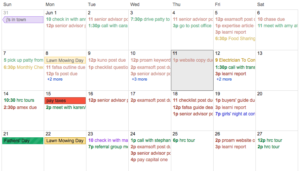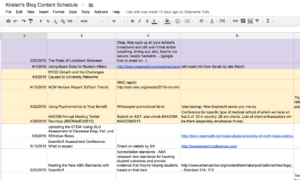If you work in marketing, you’ve likely worked with clients that use editorial calendars. The benefit of having an organized system for tracking the progress of content creation seems obvious enough when you’re an agency or business with multiple people working to create, edit, and approve the content that goes out.
benefit of having an organized system for tracking the progress of content creation seems obvious enough when you’re an agency or business with multiple people working to create, edit, and approve the content that goes out.
As a freelancer, you’re just one person. But you’re one person balancing multiple clients and a long list of assignments at any given moment. If you’re not using some version of an editorial calendar to keep all your work and deadlines organized, you’re making your life harder.
Why It Matters
One of the easiest (and most stereotypical) ways for a freelancer to lose the trust of a client is to miss deadlines. If you can’t keep up with what’s due when, not only will your life feel chaotic day in and day out, but you risk being labeled unreliable and losing business.
Editorial calendars simplify the process of keeping up with your deadlines. They make it easier to stay aware of how much work you have to do (so you don’t risk taking on more than you can handle) and prioritize what you need to work on each day in order to meet the deadlines you have.
They can also be crucial tools for staying disciplined in your own marketing. Getting client work done is one thing, but how much harder is it to stay on top of that long list of ideas you have for marketing your own freelance business? Putting your goals into an organized calendar of deadlines could be the trick to staying on top of it all.
If you charge on a project rate, an editorial calendar also makes invoicing much easier. If you can pull up a list of all the projects you worked on for a month for each client, filling in an invoice is a simple matter of copy and paste.
Use The Tool That Works For You
 I keep an editorial calendar for each client in a Google spreadsheet, as well as a Google calendar that has all my deadlines on it. Michelle Nicholaisen (a participant of our recent panel on editorial calendars) loves her tools and makes use of Trello and Evernote to keep her calendar organized. You can find loads of editorial calendar templates free online – many of them from some of the top content marketing brands out there, so you can bet they’ve been used, tested, and approved by people that know their stuff.
I keep an editorial calendar for each client in a Google spreadsheet, as well as a Google calendar that has all my deadlines on it. Michelle Nicholaisen (a participant of our recent panel on editorial calendars) loves her tools and makes use of Trello and Evernote to keep her calendar organized. You can find loads of editorial calendar templates free online – many of them from some of the top content marketing brands out there, so you can bet they’ve been used, tested, and approved by people that know their stuff.
The best system to use is whichever one works for you. There’s no point in starting an editorial calendar you never return to – you have to actually use it for it to work. But once you’ve found the format that does keep you more organized, your life and business will benefit from it.
Everyone knows before they ever start freelancing that they’ll have to get (or already be) really good at the skill they’re offering for hire. What we all have to learn along the way is the many, many other skills required for successful freelancing. Organization is definitely one of them and editorial calendars are a time-tested tool for keeping your assignments and deadlines organized in a way that helps you stay on top of your work and meet those deadlines.
- 5 Good Reasons to End a Client Relationship (And How to Do It) - January 11, 2019
- Finding an Effective Freelance Routine with Ashley Abedini - December 14, 2018
- Freelancing for Work Life Balance with Kristen Dunn - October 12, 2018
